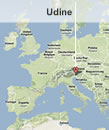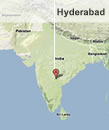India tells the EU: US, China – now it’s our turn
The meeting at the Hilton Brussels will bring together nearly 300 EU and Indian business and political leaders.
With the eyes of the world riveted on China and hopes it can help end the recession still gripping the planet, the other great power of Asia – India – has quietly begun to make its move into markets and will make its presence known in the European Union this week, with the India Calling 2009 conference trumpeting the India-Europe Business Partnership Summit. In India, more than a billion people represent a massive market.
The meeting at the Hilton Brussels will bring together nearly 300 EU and Indian business and political leaders, including India’s Commerce and Industry Minister Anand Sharma,who helped break the deadlock over the stalled World Trade Organization’s international trade talks, when its leaders met in New Delhi recently. Sharma has emerged as one of the most important trade and economic ministers in the world and is helping oversee India’s emergence as the second superpower of Asia. Other speakers include Belgium’s Foreign Affairs Minister Karel De Gucht, India’s Overseas Affairs Minister Vayalar Ravi, and External Affairs Minister of State Shashi Tharoor. A number of workshops and panels on EU-India affairs will also be held.
After appearing in other countries over the past few years, the prestigious India Calling conference makes its debut in the EU just a few weeks before the EU-India Summit in New Delhi on 6 November, and will give European and Indian business leaders a chance to do what they do best – talk business. But this isn’t merely a case of Indian leaders arriving with cap in hand looking for foreign direct investment, which they welcome, but of India’s high rollers looking to spend money in Europe and pick up some EU companies as well. “As far as India is concerned, it has not got the right place in Europe, and Indians have a lot of money, they are cash rich and they want interest in India. It’s not that India is coming to Brussels to get companies to invest in India, they want to buy companies. They have the money, the Tatas and Mittals…they have it, and India is becoming an integral part of Europe’s economic system,” said Europe India Chamber of Commerce (EICC) Secretary-General Sunil Prasad in Brussels.
He was referring to the likes of Tata Consultancy Services (TCS,) a $6 billion business that operates around the world and has many of its clients in Europe, and its partners such as Tata Motors, which is looking to displace China as a major automaker in Asia and has introduced its sudden sensation, the €2,500 Nano, designed to help low-income families own a car. Tata also operates five-star hotels in India, including the Taj Mahal, scene of last year’s terrorist attacks in Mumbai, but which is now back in business and is an international draw for business travellers and tourists, including many from the EU.
And then there’s Mittal Steel, with regional headquarters in Luxembourg, which has become the world’s biggest steelmaker. India is starting to make its mark and name in the pharmaceutical industry too, challenging the giants of Switzerland and the United States with lower-cost brands and generics aimed at helping the world’s poor. Susil Handa, whose pharmaceutical company exists in 76 countries, will attend, showing how important he considers the event is, as well as EU business. Above all, India is the new land of opportunity for EU and world business, even if still overshadowed by the skyscrapers of Shanghai in China and Beijing’s enormous political clout.
Source: Neurope.eu








